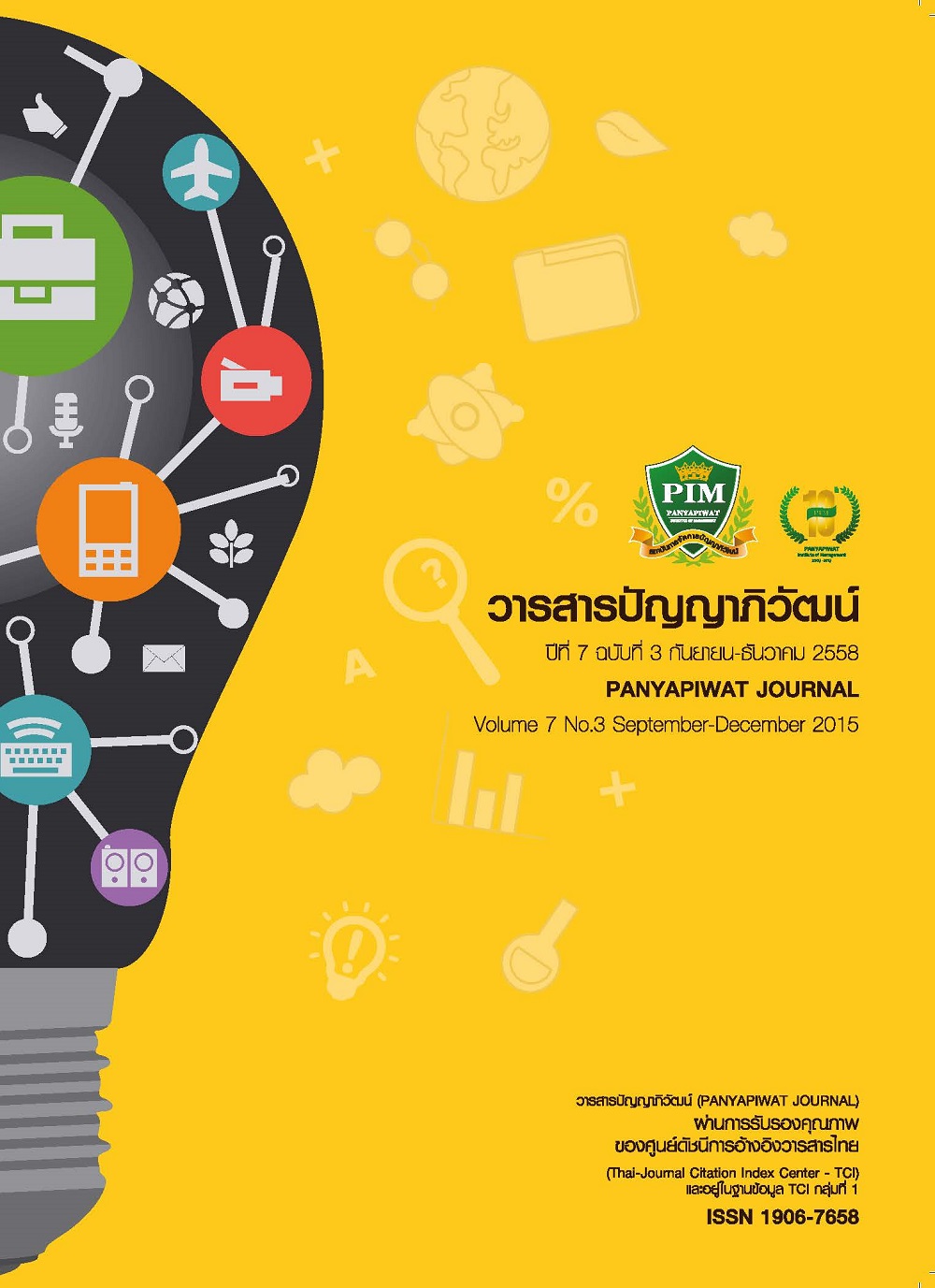ปัจจัยที่มีผลกระทบต่อการทำบัญชีครัวเรือนในชุมชนเมือง
Main Article Content
บทคัดย่อ
การวิจัยเรื่อง “ปัจจัยที่มีผลกระทบต่อการทำบัญชีครัวเรือนในชุมชนเมือง” ผู้วิจัยมีวัตถุประสงค์ที่จะศึกษาพฤติกรรม และปัจจัยที่มีผลต่อการทำบัญชีครัวเรือนในชุมชนเมืองของกรุงเทพมหานคร โดยได้ดำเนินการรวบรวมข้อมูลจากครัวเรือนในชุมชนเมือง จำนวน 247 ชุด
ผลการวิจัย พบว่า ผู้ตอบแบบสอบถามส่วนใหญ่เป็นเพศหญิง มีช่วงอายุอยู่ระหว่าง 26-35 ปี ประกอบอาชีพค้าขาย มีรายได้อยู่ระหว่าง 5,001-15,000 บาท โดยเป็นผู้ที่มีครอบครัวและมีบุตรแล้ว เกือบทั้งหมดอาศัยอยู่ในบ้านเช่า มีจำนวนสมาชิกในครัวเรือน 3-4 คน ซึ่งส่วนใหญ่เคยเข้ารับการอบรมการทำบัญชีครัวเรือน ผู้ตอบแบบสอบถามมีปัญหาในการทำบัญชีครัวเรือนในด้านของพฤติกรรมในการทำบัญชีครัวเรือนเป็นผลจาก เพศ อายุ รายได้ สถานภาพ ที่พักอาศัยที่แตกต่างกัน และการลงบัญชีผิดๆ ถูกๆ การที่คนในชุมชนสามารถให้คำแนะนำในการลงบัญชีได้ และการร่วมกิจกรรมอบรมที่หน่วยงานภายนอกเข้ามาจัดในชุมชน
The Research “Factors Affecting on Bookkeeping Household Accounting in Urban Community.” The researcher had the objectives; to study behaviors and the factors affecting toward the household accounting making in the urban community of Bangkok. The research had done by 247 data collecting, the results are as follows. Most of the informants were females and 26-35 years old. Their occupation were trading and had the income about Baht 5,001-15,000 a month. They were couple with the children. Most of their residents were rental house with 3-4 members in each household. Most of them were passed the household accounting training course and had the problems about they didn’t like the mathematic. The household accounting making behaviors depended on; gender, ages, incomes, marital status, the residences. The bad attitude toward the mathematic and fallacy of the accounting records, the accounting introducing of the neighbors and the outsider organizations training courses.
Article Details
“ข้าพเจ้าและผู้เขียนร่วม (ถ้ามี) ขอรับรองว่า บทความที่เสนอมานี้ยังไม่เคยได้รับการตีพิมพ์และไม่ได้อยู่ระหว่างกระบวนการพิจารณาลงตีพิมพ์ในวารสารหรือแหล่งเผยแพร่อื่นใด ข้าพเจ้าและผู้เขียนร่วมยอมรับหลักเกณฑ์การพิจารณาต้นฉบับ ทั้งยินยอมให้กองบรรณาธิการมีสิทธิ์พิจารณาและตรวจแก้ต้นฉบับได้ตามที่เห็นสมควร พร้อมนี้ขอมอบลิขสิทธิ์บทความที่ได้รับการตีพิมพ์ให้แก่สถาบันการจัดการปัญญาภิวัฒน์หากมีการฟ้องร้องเรื่องการละเมิดลิขสิทธิ์เกี่ยวกับภาพ กราฟ ข้อความส่วนใดส่วนหนึ่งและ/หรือข้อคิดเห็นที่ปรากฏในบทความข้าพเจ้าและผู้เขียนร่วมยินยอมรับผิดชอบแต่เพียงฝ่ายเดียว”
เอกสารอ้างอิง
กรมการพัฒนาชุมชน. (2542). การเสริมสร้างความเข้มแข็งของชุมชนเพื่อเผชิญปัญหาวิกฤต. กรุงเทพฯ: บริษัท บพิธ การพิมพ์.
กฤช เพิ่มทันจิตต์. (2536). ทฤษฎี และแนวคิดเกี่ยวกับกระบวนการเกิดเมือง กรุงเทพฯ: ครีเอทีฟ พับลิชชิ่งจํากัด.
กาญจนา แก้วเทพ. (2538), เครื่องมือการทํางานแนววัฒนธรรมชุมชน, กรุงเทพฯ: สภาคาทอลิกแห่งประเทศไทย เพื่อการพัฒนา.
คณะกรรมการพัฒนาการเศรษฐกิจและสังคมแห่งชาติ. (2544). “ชุมชนเข้มแข็งทางเลือกใหม่ของการพัฒนา.” เอกสาร
ข่าวการพัฒนา (กุมภาพันธ์ 2544: 3).
คณะกรรมการพัฒนาการเศรษฐกิจและสังคมแห่งชาติ. (2544). “ชุมชนเข้มแข็งรากฐานการพัฒนาประเทศที่ยั่งยืน”วารสารเศรษฐกิจและสังคม, (มกราคม-เมษายน 2544), 19-20.
คณะอนุกรรมการนโยบายที่อยู่อาศัย คณะกรรมการพัฒนาการเศรษฐกิจและสังคมแห่งชาติ. (2531), รายงานสถานการณ์ ที่อยู่อาศัย ปี 2531. กรุงเทพฯ: ธนาคารอาคารสงเคราะห์.
จันทิมา ฉัตรไชยสิทธิกูล. (2529), การศึกษารูปแบบการตั้งถิ่นฐานของชุมชนแออัดในกรุงเทพฯ. วิทยานิพนธ์ปริญญา การวางแผนภาคและเมืองมหาบัณฑิต, จุฬาลงกรณ์มหาวิทยาลัย.
ชยันต์ วรรธนะภูติ, (2536). “การกําหนดกรอบคิดในการวิจัย” ใน อุทัย ดุลยเกษม, คู่มือการวิจัยเชิงคุณภาพเพื่อการพัฒนา กรุงเทพฯ: สถาบันวิจัยและพัฒนามหาวิทยาลัยขอนแก่น.
ชัยมงคล เตียวสกุล. (2545). ระบบบัญชีการเงิน กรณีศึกษาตําบลป่ายาว อําเภอสารภี จังหวัดเชียงใหม่, วิทยานิพนธ์ปริญญาโท, มหาวิทยาลัยเชียงใหม่.
ฐิรวุฒิ เสนาคํา. (2540), จากปัจเจกสู่สาธารณะ: กระบวนการเสริมสร้างชุมชนให้เข้มแข็ง, กรุงเทพฯ: สถาบันชุมชน ท้องถิ่นพิมพ์.
ดารณี ถวิลพิพัฒน์กุล. (2539). กระบวนการเป็นเมืองกับการเปลี่ยนแปลงทางสังคมในประเทศกําลังพัฒนา, กรุงเทพฯ สํานักพิมพ์จุฬาลงกรณ์มหาวิทยาลัย.
ทัศนีย์ ลักขณาภิชนชัช. (2545). การสังคมสงเคราะห์ชุมชน: มรรควิธีสู่ชุมชนเข้มแข็ง กรุงเทพฯ : โรงพิมพ์มหาวิทยาลัยธรรมศาสตร์.
นภาพร ลิขิตวงศ์ขจร. (2550). “บัญชีครัวเรือน: เครื่องมือสู่เศรษฐกิจพอเพียง” วารสารศูนย์บริการวิชาการ, มหาวิทยาลัยขอนแก่น.
นิรันดร์ สุรัสวดี. (2539), คุณภาพชีวิตของประชาชนในเขตเทศบาลเมืองอุบลราชธานี: ด้านเศรษฐกิจ, กรุงเทพฯ สถาบันบัณฑิตพัฒนบริหารศาสตร์.
ปภังกร ขนติวโร. (2549). การใช้พระพุทธศาสนากับเศรษฐกิจพอเพียงในการแก้ปัญหาวิกฤติทางเศรษฐกิจ.
ปาริชาติ วลัยเสถียร. (2543). กระบวนการและเทคนิคการทํางานของนักพัฒนา กรุงเทพฯ: สํานักงานกองทุนสนับสนุนการวิจัย.
ราชบัณฑิตยสถาน. (2525), พจนานุกรมฉบับราชบัณฑิตยสถาน พ.ศ. 2525. กรุงเทพฯ: อักษรเจริญทัศน์.
สมัย แก้วภูศรี. (2547). แนวทางการแก้ไขปัญหาหนี้สินชุมชนบ้านอุดมพัฒนา หมู่ที่ 2 ตําบลศรีวิชัย อําเภอลี้ จังหวัด
ลําพูน.
สํานักงานสถิติแห่งชาติ. (2547). จํานวนหนี้สินเฉลี่ยต่อครัวเรือน จําแนกตามวัตถุประสงค์ของการกู้ยืมและสถานะทางเศรษฐสังคมของครัวเรือน.
สุภาคย์ อินทองคง. (2550). การใช้หลักพุทธธรรมนําการวิจัยและพัฒนาตามปรัชญาเศรษฐกิจพอเพียงสู่สุขภาพองค์รวม.
Pride, Hughes & Kapoor. (1996). Analyzing and reporting financial information, p.534.
Translated Thai References
Chatchaisittikil, J. (1986). The study of slum settlements in Bangkok. Dissertation of Master planning and analysis. Department of Urban and Regional Planning The Graduate School Chulalongkorn University. [in Thai]
Community development. Department. (1999). The strengthening of the community to face the crisis. Bangkok: Bopit Kanpim company. [in Thai]
Intongkong, S. (2007). Using Buddhism leading research and development based on the sufficiency economy philosophy to holistic health. [in Thai]
Kaewphusri, S. (2004). The solution rich liabilities community development Moo 2, Tambon Sri Lanka District, Lamphun Province. [in Thai]
Kaewthep, K. (1995). Culture Community functional tools. Bangkok: Catholic Council of Thailand for Development. [in Thai]
Khantivaro, P. (2006). The use of religion to the economy enough to solve the economic crisis. [in Thai]
Lakkanapitchawanachat, T. (2002). The community Social Welfare: Approach to strong communities. Bangkok: Thammasat University publisher. [in Thai]
Likhitwongkhajohn, N. (2007). "Household accounts: the sufficiency economy”. Journal of Academic Services, Khon Kaen University. [in Thai]
National Economic and Social Development Board Office. (2001). "Strong communities foundation for sustainable development.” Journal of Social and Economic, (January-April 2001), 19-20.[in Thai]
National Economic and Social Development Board. Office. (2001). "Choice of developing strong communities.”. Release Development (February 2001: 3). [in Thai]
National Statistical Office. (2004). Average debt per household By purpose of the loan and the socioeconomic status of the household. [in Thai]
Poemtanchit, K. (1993). Theories about the birth city. Bangkok: Creative Publishing Limited. [in Thai]
Royal Academy. (1982). Dictionary of 1982. Bangkok: Aksorn Charoen Tat. [in Thai]
Senakum, T. (1997). From the individual to the public. Strengthen The process community is strengthened. Bangkok: Print local community institutions. [in Thai]
Subcommittee on Housing Policy National Economic and Social Development Board. (1988). Report The housing situation in 1988. Bangkok: Government housing Bank. [in Thai]
Surasavadee, N. (1996). The quality of life for residents in the municipality of Ubon Ratchathani: the economy. Bangkok: Institute of Development Administration. [in Thai]
Tawinpipatkol, D. (1996). Urbanization The process of social transformation in developing countries. Bangkok: Chulalongkorn University publishing. [in Thai]
Teawsakol, C. (2002). Financial Accounting System case study PaYaw Sarapee District. Dissertation of master's degree, Chaingmai University. [in Thai]
Wattanaput, C. (1993). "The idea of a research framework”. In Doonkasem, A., Qualitative research to guide development. Bangkok: Thailand Development Research Institute and University.[in Thai]
Walaisatian, P. (2000). Process and work technique of developer. Bangkok: The department of research support fund.


